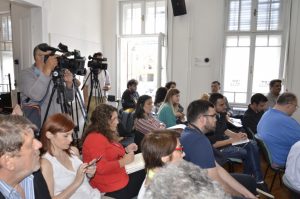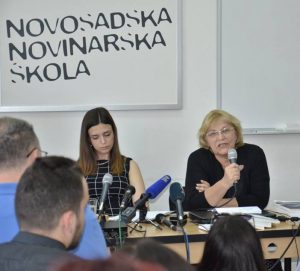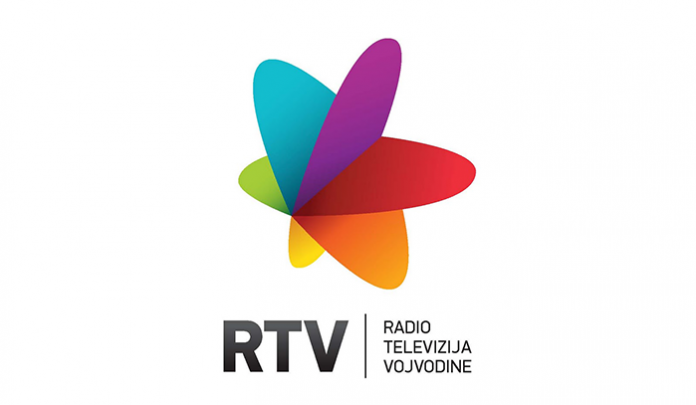Round table on the professionalism of Radio Television of Vojvodina (the public service broadcaster of Serbia’s northern province of Vojvodina) was held on 26 May 2016 in Novi Sad, organized by the Novi Sad School of Journalism, a SEENPM member, and the South East European Network for Professionalization of Media (SEENPM), within the framework of the project South East European Media Observatory (implemented in 10 countries).
The round table was held to address a wave of sudden and unfounded dismissals of editors and journalists at the Radio Television of Vojvodina (RTV) by presenting data resulting from content analysis of RTV and providing an opportunity for a discussion based on arguments.
 Interim results and comparisons of results of RTV’s TV and radio program monitoring were presented at the event. The Novi Sad School of Journalism has implemented the monitoring within the project ‘Transformation of the state-centric Radio Television Novi Sad into Vojvodina’s public service broadcaster ‘ since 2006 and within the international project ‘South East European Media Observatory – Building Capacities and Coalitions for Monitoring Media Integrity and Advancing Media Reforms’ since 2012. Two more research projects are ongoing: six-months long (January – June 2016) monitoring of public service broadcasters RTV and RTS (Radio Television of Serbia) and finalization of the election campaign monitoring (March – April 2016). The results presented at the round table are available in Serbian.
Interim results and comparisons of results of RTV’s TV and radio program monitoring were presented at the event. The Novi Sad School of Journalism has implemented the monitoring within the project ‘Transformation of the state-centric Radio Television Novi Sad into Vojvodina’s public service broadcaster ‘ since 2006 and within the international project ‘South East European Media Observatory – Building Capacities and Coalitions for Monitoring Media Integrity and Advancing Media Reforms’ since 2012. Two more research projects are ongoing: six-months long (January – June 2016) monitoring of public service broadcasters RTV and RTS (Radio Television of Serbia) and finalization of the election campaign monitoring (March – April 2016). The results presented at the round table are available in Serbian.
Nedim Sejdinović, president of the Independent Journalists’ Society of Vojvodina, presented the report “Minority and multilingual media in the context of media laws implementation” which points out the importance of RTV program diversity in the languages of national minorities. Sejdinović stressed the importance of raising awareness among citizens on the importance of public service broadcasters and mechanisms of the control of programs available to citizens.
Zoran Gavrilović of the Bureau for Social Research announced publishing of the research on the state of the media. The research is based on the analysis of public opinion and media monitoring. According to Gavrilović, the results show that the majority of citizens do not have information on the concept of public service media or financing and managing thereof.
Aleksandra Đurić Bosnić spoke on behalf of the RTV’s Program Council. She assessed current situation at RTV as “unfortunate and paradoxical where the results of a large number of journalists awarded for their work are being undermined”. She concluded that even in the case that the implemented dismissals had been legal, they would not have been legitimate. Regarding this the Program Council submitted a request for explanation to the new RTV’s management, but has not received an answer yet.
Jovanka Matić of the Insitute for Social Sciences, who is the main methodologist of the Novi Sad School of Journalism media monitoring, assessed the functioning of public service broadcasters in the

service of media freedom and media integrity, based on the indicators used by the European Union in its enlargement policy. Matić stressed the necessity of overcoming the conflict around the basic understanding of the concept of public service media in Serbia. The implementation of the said indicators can only be done after the conflict is overcome.
Slobodan Arežina, dismissed director of RTV’s program, said that the current situation is an abuse of the media by engaging them in political conflict. Arežina spoke about the quality of work of dismissed journalists and expressed doubts regarding further growth of RTV’s positive trend.
Sanja Kljajić, an RTV journalist and a representative of the movement “Support RTV” (gathered around the initiative to support the employees of RTV in maintaining the reputation, quality and independence of RTV), presented the movement’s requests to the new leadership. Kljajić said that the dismissed workers have no one to talk to about the changes although they do not want to fight for positions, but for products of their work.
Representatives of the new editorial team of RTV were invited to the round table, but they did not join it.
It was concluded that as many events such as this one are necessary in order to enable inter-sectoral cooperation and the exchange of opinions on the concept of public service media, as well as to bring the importance and the role of public service media closer to the citizens.








